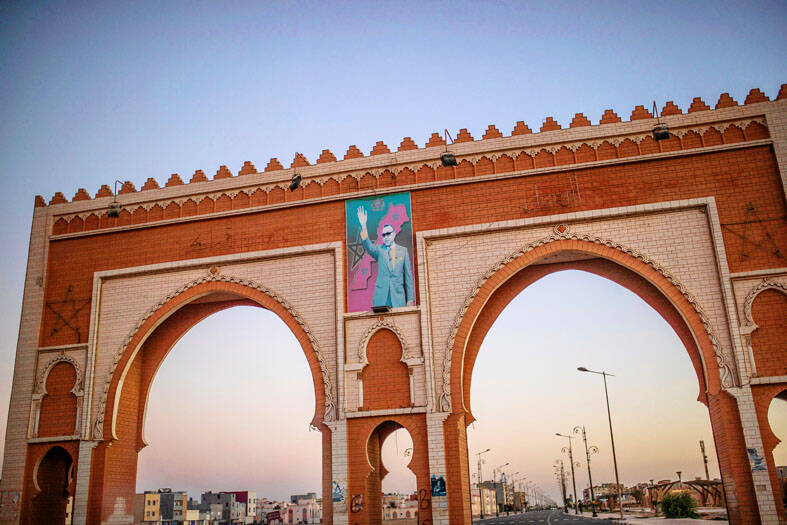The UN Security Council on Friday voted in favor of a resolution backing Morocco’s autonomy plan for Western Sahara as the “most feasible” solution for the disputed territory, triggering celebrations in Rabat, but angering Algeria.
Western Sahara is a mineral-rich former Spanish colony that is largely controlled by Morocco, but has been claimed for decades by the pro-independence Polisario Front, which is supported by Algeria.
The council had previously urged Morocco, the Polisario Front, Algeria and Mauritania to resume talks to reach an agreement.

Photo: AP
However, at the initiative of US President Donald Trump’s administration, the council shifted to support a plan, initially presented by Rabat in 2007, in which Western Sahara would enjoy autonomy under Morocco’s sole sovereignty.
The resolution, adopted by an 11-0 vote with three abstentions and Algeria refusing to participate, said autonomy for Western Sahara under Moroccan sovereignty may be the basis for future negotiations to resolve the 50-year-old conflict.
“Genuine autonomy under Moroccan sovereignty could constitute a most feasible solution,” the resolution said.
Moroccan King Mohammed VI lauded the vote as “historic,” saying “we are opening a new and victorious chapter in the process of enshrining the Moroccan character of the Sahara.”
In Rabat, thousands of people danced and sang to celebrate the vote.
“The Sahara is Moroccan and always has been,” chanted the joyful crowds, alternating the rhythm with the national anthem and other patriotic songs.
In Smara, a city in the disputed territory, residents set off fireworks as soon as the vote was announced.

Right-wing political scientist Laura Fernandez on Sunday won Costa Rica’s presidential election by a landslide, after promising to crack down on rising violence linked to the cocaine trade. Fernandez’s nearest rival, economist Alvaro Ramos, conceded defeat as results showed the ruling party far exceeding the threshold of 40 percent needed to avoid a runoff. With 94 percent of polling stations counted, the political heir of outgoing Costa Rican President Rodrigo Chaves had captured 48.3 percent of the vote compared with Ramos’ 33.4 percent, the Supreme Electoral Tribunal said. As soon as the first results were announced, members of Fernandez’s Sovereign People’s Party

EMERGING FIELDS: The Chinese president said that the two countries would explore cooperation in green technology, the digital economy and artificial intelligence Chinese President Xi Jinping (習近平) yesterday called for an “equal and orderly multipolar world” in the face of “unilateral bullying,” in an apparent jab at the US. Xi was speaking during talks in Beijing with Uruguayan President Yamandu Orsi, the first South American leader to visit China since US special forces captured then-Venezuelan president Nicolas Maduro last month — an operation that Beijing condemned as a violation of sovereignty. Orsi follows a slew of leaders to have visited China seeking to boost ties with the world’s second-largest economy to hedge against US President Donald Trump’s increasingly unpredictable administration. “The international situation is fraught

MORE RESPONSIBILITY: Draftees would be expected to fight alongside professional soldiers, likely requiring the transformation of some training brigades into combat units The armed forces are to start incorporating new conscripts into combined arms brigades this year to enhance combat readiness, the Executive Yuan’s latest policy report said. The new policy would affect Taiwanese men entering the military for their compulsory service, which was extended to one year under reforms by then-president Tsai Ing-wen (蔡英文) in 2022. The conscripts would be trained to operate machine guns, uncrewed aerial vehicles, anti-tank guided missile launchers and Stinger air defense systems, the report said, adding that the basic training would be lengthened to eight weeks. After basic training, conscripts would be sorted into infantry battalions that would take

GROWING AMBITIONS: The scale and tempo of the operations show that the Strait has become the core theater for China to expand its security interests, the report said Chinese military aircraft incursions around Taiwan have surged nearly 15-fold over the past five years, according to a report released yesterday by the Democratic Progressive Party’s (DPP) Department of China Affairs. Sorties in the Taiwan Strait were previously irregular, totaling 380 in 2020, but have since evolved into routine operations, the report showed. “This demonstrates that the Taiwan Strait has become both the starting point and testing ground for Beijing’s expansionist ambitions,” it said. Driven by military expansionism, China is systematically pursuing actions aimed at altering the regional “status quo,” the department said, adding that Taiwan represents the most critical link in China’s